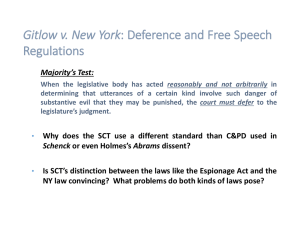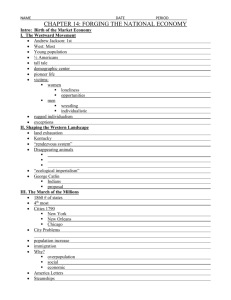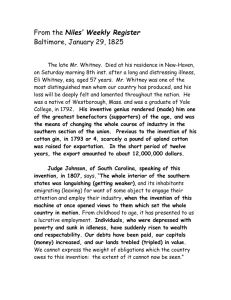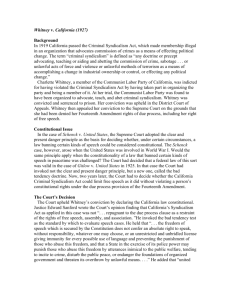Don Nguyen, AP US Gov, Court Case #16. Whitney v. California
advertisement
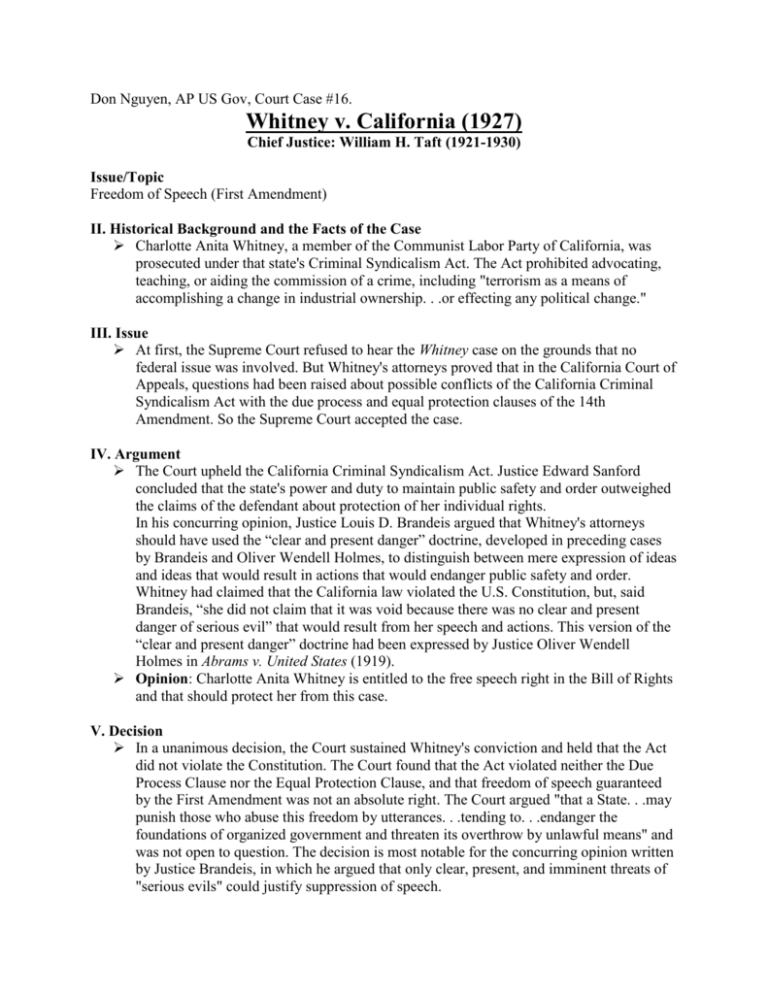
Don Nguyen, AP US Gov, Court Case #16. Whitney v. California (1927) Chief Justice: William H. Taft (1921-1930) Issue/Topic Freedom of Speech (First Amendment) II. Historical Background and the Facts of the Case Charlotte Anita Whitney, a member of the Communist Labor Party of California, was prosecuted under that state's Criminal Syndicalism Act. The Act prohibited advocating, teaching, or aiding the commission of a crime, including "terrorism as a means of accomplishing a change in industrial ownership. . .or effecting any political change." III. Issue At first, the Supreme Court refused to hear the Whitney case on the grounds that no federal issue was involved. But Whitney's attorneys proved that in the California Court of Appeals, questions had been raised about possible conflicts of the California Criminal Syndicalism Act with the due process and equal protection clauses of the 14th Amendment. So the Supreme Court accepted the case. IV. Argument The Court upheld the California Criminal Syndicalism Act. Justice Edward Sanford concluded that the state's power and duty to maintain public safety and order outweighed the claims of the defendant about protection of her individual rights. In his concurring opinion, Justice Louis D. Brandeis argued that Whitney's attorneys should have used the “clear and present danger” doctrine, developed in preceding cases by Brandeis and Oliver Wendell Holmes, to distinguish between mere expression of ideas and ideas that would result in actions that would endanger public safety and order. Whitney had claimed that the California law violated the U.S. Constitution, but, said Brandeis, “she did not claim that it was void because there was no clear and present danger of serious evil” that would result from her speech and actions. This version of the “clear and present danger” doctrine had been expressed by Justice Oliver Wendell Holmes in Abrams v. United States (1919). Opinion: Charlotte Anita Whitney is entitled to the free speech right in the Bill of Rights and that should protect her from this case. V. Decision In a unanimous decision, the Court sustained Whitney's conviction and held that the Act did not violate the Constitution. The Court found that the Act violated neither the Due Process Clause nor the Equal Protection Clause, and that freedom of speech guaranteed by the First Amendment was not an absolute right. The Court argued "that a State. . .may punish those who abuse this freedom by utterances. . .tending to. . .endanger the foundations of organized government and threaten its overthrow by unlawful means" and was not open to question. The decision is most notable for the concurring opinion written by Justice Brandeis, in which he argued that only clear, present, and imminent threats of "serious evils" could justify suppression of speech. VI. Reasoning Justice Brandeis's concurring opinion has the tone of a dissent. It immediately influenced the life of Charlotte Anita Whitney. The California governor, C. C. Young, pardoned her only a few months after the Supreme Court decision; he gave reasons similar to the ideas in Justice Brandeis's opinion. VII. Personal Opinion I say that Charlotte Anita Whitney had the right of free speech from the First Amendment and the Criminal Syndicalism Act was specifically for the state. Every U.S. citizen is entitled to free speech although I believe that there should be some type of restriction on what people say because the free speech right, does it let say whatever you want? VIII. Historical Significance of the Case In 1969 the Supreme Court overturned the Whitney decision in its ruling in Brandenburg v. Ohio. The ideas of Justice Brandeis influenced the Court's reasoning in this case; it pointed out a defense of free speech rights that could have prevailed for Whitney, if only she and her attorney had used this line of reasoning to support her case. IX. Citations "Whitney v. California." OYEZ. OYEZ U.S. Supreme Court Media, n.d. Web. 17 Apr 2011. <http://www.oyez.org/cases/1901-1939/1925/1925_3> "Whitney v. California." Answers.com. Answers Corporation, n.d. Web. 28 Apr 2011. <http://www.answers.com/topic/whitney-v-california>. "Whitney v. California." The Free Dictionary. Farlex, Inc., n.d. Web. 28 Apr 2011. <http://encyclopedia.thefreedictionary.com/Whitney+v.+California>.
